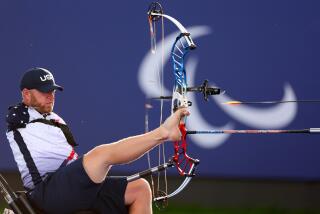Her Best Shot: Against Odds : For Gail Liberty, Road to World Championships Is Turning Into a Duel With Multiple Sclerosis
- Share via
CHINO — In this sport, the key is stability, pistol shooter Gail Liberty said.
To help, there is apparel, intended to eliminate all distractions and reduce the relationship to eye, mind and a target 25 meters away.
There are special leather shoes, she said, pulling a pair out of a duffel bag.
“They’re flat on the bottom, so they provide a little more stability, plus they come up around your ankles, so they provide stability there, too,” she said. “They’re rubber (soled), but there are no heels on them.”
There are glasses, worn even by those with perfect sight.
“What you need to have in focus is not right in front of your eye,” she said. “It’s a shooting pistol, and that’s at arm’s length.”
There are sound-proof ear muffs, and blinders to negate peripheral vision.
“That’s just so you don’t see what’s going on around you,” she said.
Some, but not she, put their free hand in a pocket, to relax.
“Most people hang it over their belt or waistline, just put their thumb over to relax their arm,” she said. “But if you put it a pocket, it changes with whatever you’re wearing because pockets are at different angles.”
Hopefully then, the shooter is able to steady the pistol long enough to recognize the exact trigger-squeezing moment, well enough to direct a bullet through a bull’s-eye 1 1/2-inches in diameter.
It is simple, therefore, to see why Gail Liberty, 48, of San Antonio, is not the shooter she was before she got multiple sclerosis 2 1/2 years ago.
She still hits often enough to be one of the top six or so U.S. women shooters in air pistol and sport pistol competition. But the days when she could enter any match on any continent and automatically be the favorite are gone, having given way to a series of duels between her and her nerves.
Multiple sclerosis attacks the central nervous system, causing everything from numbness to muscle spasms. And, always, there is unsteadiness. “You don’t have it one shot, and not have it the next,” she said. “It just kind of stays with you.”
Liberty’s sport rewards those who do not shake, and has little tolerance for a disease such as MS. To a great degree, she is left to hold the gun, aim, and guess.
Said Dan Iuga, the Olympic and national pistol coach: “When you shake, you are not able to concentrate on the trigger. You don’t have enough courage to press the trigger. You don’t know where it goes, so it makes it psychologically difficult also.
“Even if you have a cold, that cold will affect your shooting.”
Of course, all this is melodrama to Liberty, an Air Force retiree, a former nurse in Vietnam. If the sky has really fallen, she asks, then why is she still here? As a contender for the title, even?
Of the 600 competitors at this week’s 26th U.S. International shooting championships running through June 27 at the Prado Tiro Range here, Liberty is the only one with such a disability. And Iuga, looking back on 23 years of shooting, cannot think of a similar case.
Yet, the uniqueness of her situation is lost on Liberty.
“My philosophy is that you can’t do anything about it,” she said. “You have it. Just do the best you can in everything. I thought I was a little old to get it, but I got it, so what can you do?”
A reserved, polite woman, she goes about her business quietly. And though her gait has been slowed since MS struck, and her handwriting is less uniform, she is oblivious to whether her fellow shooters notice her illness.
“I don’t pay attention to other people,” she said. “I don’t look around to see if anybody’s looking.” Some people obviously do know of her affliction, she said. “But I don’t make a big deal of it. I don’t try and hide it, but I don’t volunteer the information either.”
Although MS tends to cause fatigue, Liberty also runs, swims, lifts weights, and does arm exercises. And her appetite to shoot is as great as any, Iuga said.
The competition here is the fourth of five qualifying matches for the World Shooting Championships Sept. 2-14 in Suhl, East Germany. To qualify, a shooter needs to attend a minimum of three matches, among them this one. Liberty will be one of those who has attended all five, however, in the hope that her sickness won’t flare up in more than two of them.
But for all her work and insistence that MS is just another distraction, the disease has caught up with her.
The International Women’s Sport Pistol champion in 1983, Liberty learned that she had MS in December of the same year. Because of the double vision she suffered for the first seven weeks, she thought at first that it was a brain tumor. But as the U.S. Olympic trials approached in June of 1984--the first year that there were separate women’s shooting teams--she also experienced muscle spasms, especially on her right side, her shooting side. The team took only two women. She finished fourth, with no excuses.
Liberty was also expected to tour Europe with the U.S. national team this summer. In April, however, during another qualifying match here, Iuga noticed excessive unsteadiness when she aimed the pistol. Her scores were erratic, and with the demanding schedule planned for the U.S. team overseas, Iuga and Liberty agreed that it would be best if she stayed home.
“It’s frustrating not to shoot as well as you know you’d be able to, but that’s the way it is,” said Liberty, a co-world champion in 1962, a national champion in 1963 and a silver and bronze medalist in air pistol and sport pistol, respectively, at the 1983 Pan Am Games.
“I don’t worry about it. When the match is over, it’s over. What’s on the board is on the board.
“I used to say there’s life after the Olympics,” she said. “There’s something else to do. There’s other things in life.”
More to Read
Go beyond the scoreboard
Get the latest on L.A.'s teams in the daily Sports Report newsletter.
You may occasionally receive promotional content from the Los Angeles Times.






